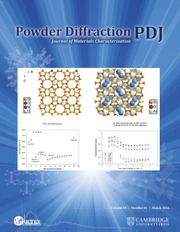Crossref Citations
This article has been cited by the following publications. This list is generated based on data provided by
Crossref.
Campbell Roberts, Sarra N
Williams, Adrian C
Grimsey, Ian M
and
Booth, Steven W
2002.
Quantitative analysis of mannitol polymorphs. FT-Raman spectroscopy.
Journal of Pharmaceutical and Biomedical Analysis,
Vol. 28,
Issue. 6,
p.
1135.
Campbell Roberts, Sarra N
Williams, Adrian C
Grimsey, Ian M
and
Booth, Steven W
2002.
Quantitative analysis of mannitol polymorphs. X-ray powder diffractometry—exploring preferred orientation effects.
Journal of Pharmaceutical and Biomedical Analysis,
Vol. 28,
Issue. 6,
p.
1149.
Meyer, Jeffrey D.
Jun Bai, Shu
Rani, Meena
Suryanarayanan, Raj
Nayar, Rajiv
Carpenter, John F.
and
Manning, Mark C.
2004.
Infrared spectroscopic studies of protein formulations containing glycine.
Journal of Pharmaceutical Sciences,
Vol. 93,
Issue. 5,
p.
1359.
Fix, I.
and
Steffens, K.‐J.
2004.
Quantifying Low Amorphous or Crystalline Amounts of Alpha‐Lactose‐Monohydrate Using X‐Ray Powder Diffraction, Near‐Infrared Spectroscopy, and Differential Scanning Calorimetry.
Drug Development and Industrial Pharmacy,
Vol. 30,
Issue. 5,
p.
513.
Nunes, Cletus
Mahendrasingam, Arumugam
and
Suryanarayanan, Raj
2005.
Quantification of Crystallinity in Substantially Amorphous Materials by Synchrotron X-ray Powder Diffractometry.
Pharmaceutical Research,
Vol. 22,
Issue. 11,
p.
1942.
Varshney, Dushyant B.
Kumar, Satyendra
Shalaev, Evgenyi Y.
Kang, Shin-Woong
Gatlin, Larry A.
and
Suryanarayanan, Raj
2006.
Solute Crystallization in Frozen Systems–Use of Synchrotron Radiation to Improve Sensitivity.
Pharmaceutical Research,
Vol. 23,
Issue. 10,
p.
2368.
Giron, Danielle
Monnier, S.
Mutz, M.
Piechon, P.
Buser, T.
Stowasser, F.
Schulze, K.
and
Bellus, M.
2007.
Comparison of quantitative methods for analysis of polyphasic pharmaceuticals.
Journal of Thermal Analysis and Calorimetry,
Vol. 89,
Issue. 3,
p.
729.
Yamamura, Shigeo
Takahira, Rieko
and
Momose, Yasunori
2007.
Crystallization Kinetics of Amorphous Griseofulvin by Pattern Fitting Procedure Using X-Ray Diffraction Data.
Pharmaceutical Research,
Vol. 24,
Issue. 5,
p.
880.
De Spiegeleer, B.
Baert, B.
Diericx, N.
Seghers, D.
Verpoort, F.
Van Vooren, L.
Burvenich, C.
and
Slegers, G.
2007.
Assessment of the solid-state composition of an active salicylanilide compound by FT-Raman spectroscopy.
Journal of Pharmaceutical and Biomedical Analysis,
Vol. 44,
Issue. 1,
p.
254.
Német, Zoltán
Kis, Győző Csonka
Pokol, György
and
Demeter, Ádám
2009.
Quantitative determination of famotidine polymorphs: X-ray powder diffractometric and Raman spectrometric study.
Journal of Pharmaceutical and Biomedical Analysis,
Vol. 49,
Issue. 2,
p.
338.
Rumondor, Alfred C.F.
and
Taylor, Lynne S.
2010.
Application of Partial Least-Squares (PLS) modeling in quantifying drug crystallinity in amorphous solid dispersions.
International Journal of Pharmaceutics,
Vol. 398,
Issue. 1-2,
p.
155.
Debnath, Smita
2011.
Oral Bioavailability.
p.
7.
Hartel, Richard W.
Ergun, Roja
and
Vogel, Sarah
2011.
Phase/State Transitions of Confectionery Sweeteners: Thermodynamic and Kinetic Aspects.
Comprehensive Reviews in Food Science and Food Safety,
Vol. 10,
Issue. 1,
p.
17.
Padrela, Luis
de Azevedo, Edmundo Gomes
and
Velaga, Sitaram P.
2012.
Powder X-ray diffraction method for the quantification of cocrystals in the crystallization mixture.
Drug Development and Industrial Pharmacy,
Vol. 38,
Issue. 8,
p.
923.
Baird, Jared A.
and
Taylor, Lynne S.
2012.
Evaluation of amorphous solid dispersion properties using thermal analysis techniques.
Advanced Drug Delivery Reviews,
Vol. 64,
Issue. 5,
p.
396.
Dave, Rutesh H.
Patel, Hardikkumar H.
Donahue, Edward
and
Patel, Ashwinkumar D.
2013.
To evaluate the change in release from solid dispersion using sodium lauryl sulfate and model drug sulfathiazole.
Drug Development and Industrial Pharmacy,
Vol. 39,
Issue. 10,
p.
1562.
Taylor, Lynne S.
2015.
Pharmaceutical Sciences Encyclopedia.
p.
1.
Ilevbare, Grace
Marsac, Patrick
and
Mitra, Amitava
2015.
Discovering and Developing Molecules with Optimal Drug-Like Properties.
Vol. 15,
Issue. ,
p.
287.
Lavrič, Zoran
Pirnat, Janez
Lužnik, Janko
Puc, Uroš
Trontelj, Zvonko
and
Srčič, Stane
2015.
14 N Nuclear Quadrupole Resonance Study of Piroxicam: Confirmation of New Polymorphic Form V.
Journal of Pharmaceutical Sciences,
Vol. 104,
Issue. 6,
p.
1909.
Thakral, Seema
Terban, Maxwell W.
Thakral, Naveen K.
and
Suryanarayanan, Raj
2016.
Recent advances in the characterization of amorphous pharmaceuticals by X-ray diffractometry.
Advanced Drug Delivery Reviews,
Vol. 100,
Issue. ,
p.
183.


